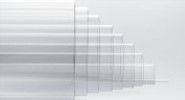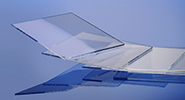BOROFLOAT®
Phenomenally clear, outstanding strong
Outstanding thermal resistance, exceptionally high transparency, high chemical durability, excellent mechanical strength – these key technical qualities ensure that BOROFLOAT® is the world’s go-to floated glass. SCHOTT’s proprietary microfloat production process provides BOROFLOAT® with exceptional optical qualities, while superior abrasion and scratch resistance ensures the glass performs in the most demanding industrial environments.



